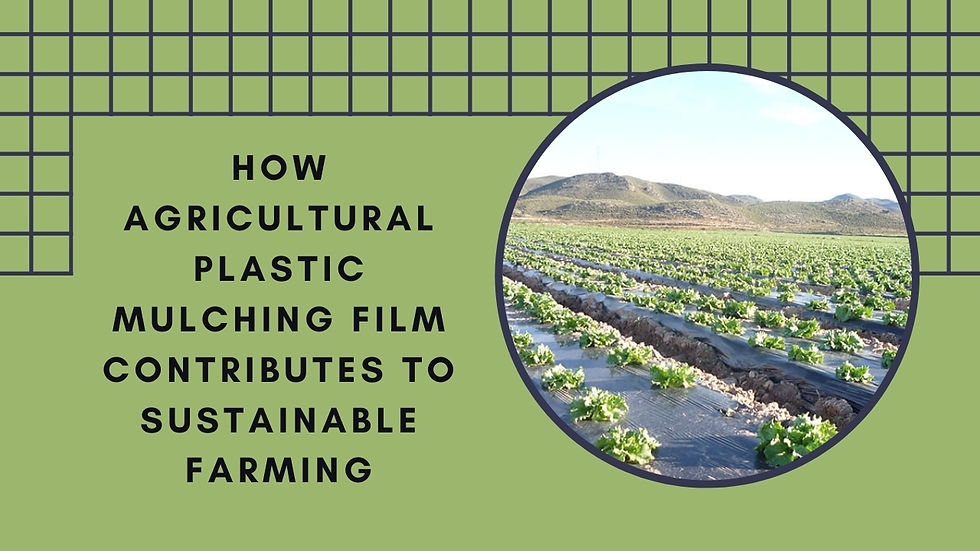How Agricultural Plastic Mulching Film Contributes to Sustainable Farming
- manitzavien8
- Jun 18, 2024
- 4 min read

In the quest for sustainable farming, innovative solutions like agricultural plastic mulching film have become invaluable. This wonder material is not just a trend but a revolution that is transforming modern agriculture. If you are an agri-business or retailer in the agricultural industry, understanding and leveraging this technology can significantly boost your operations. Here's everything you need to know about how agricultural plastic mulching film contributes to sustainable farming.
Introduction to Agricultural Plastic Mulching Film
Agricultural plastic mulching film is a specialized sheet used in farming to cover the soil around plants. This practice offers multiple benefits—from weed suppression to moisture conservation—making it a must-have for any modern farmer looking to enhance crop productivity sustainably.
Why Sustainable Farming Matters
Sustainable farming aims to meet the current food needs without compromising the ability of future generations to meet theirs. It focuses on conservation, reducing resource consumption, and maintaining eco-balance. Agricultural plastic mulching film aligns perfectly with these goals, providing both immediate and long-term benefits.
The Basics of Agricultural Plastic Mulching Film
What Is Agricultural Plastic Mulching Film?
Agricultural plastic mulching film is made from high-quality plastic materials that are extruded into thin sheets and cut into convenient sizes. These films are UV-stabilized and tear-resistant, ensuring longevity and robust performance in various agricultural conditions.
Varieties and Specifications
The film comes in different thicknesses and colors tailored to specific farming needs:
15 Micron – Suitable for one-season crops
25 or 30 Micron – Ideal for two to three-season crops
50 Micron – Best for orchards
Colors – Options include Silver + Black, Black Only, Red + Black, White + Black, and Natural
Application Areas
Applicable in a wide range of farming scenarios, these films help increase soil temperature, speed up germination, reduce herbicide use, and more.
Key Benefits of Agricultural Plastic Mulching Film
Weed Suppression
One of the most significant advantages of using plastic mulch is its ability to suppress weeds. The film acts as a barrier, preventing sunlight from reaching the soil, thereby inhibiting weed growth. This minimizes competition for nutrients and water, allowing your crops to thrive.
Moisture Conservation
Agricultural plastic mulching film reduces soil evaporation, conserving moisture. This is particularly beneficial in arid climates where water is scarce. Reduced irrigation needs translate to lower water bills and a more sustainable farming practice.
Temperature Regulation
The film helps regulate soil temperature by retaining heat, creating a favorable microclimate for early plant growth. Consistent temperatures are crucial for sensitive crops, and plastic mulch provides that stability.
Enhanced Crop Quality
By preventing fruits and vegetables from coming into direct contact with the soil, the film ensures cleaner produce. This reduces the likelihood of soil-borne diseases and improves overall crop quality.
Environmental and Economic Impact
Reducing Chemical Usage
By suppressing weeds naturally, agricultural plastic mulching film reduces the need for herbicides and pesticides. This is not only better for the environment but also for the health of consumers.
Cost-Effectiveness
While there is an initial investment required for purchasing the film, the long-term savings on water, labor, and chemicals more than compensate for the cost. The improved yield and crop quality also contribute to higher profitability.
Sustainable Practices
Using plastic mulch aligns with sustainable farming practices by conserving water, reducing chemical usage, and enhancing soil health. It supports the broader goal of agriculture that is both productive and environmentally responsible.
Common Misconceptions About Plastic Mulch
Plastic Mulch is Not Eco-Friendly
While it is true that plastic products have an environmental impact, the benefits of using plastic mulch in sustainable farming often outweigh the drawbacks. Many manufacturers now offer biodegradable options to address these concerns.
It's Too Expensive
The initial cost may seem high, but the long-term savings and increased productivity make it a cost-effective solution. Many farmers find that the return on investment (ROI) justifies the expense.
How Tilak Polypack Stands Out
Premium-Grade Materials
At Tilak Polypack, we use only the highest quality materials to manufacture our laying plastic mulch. This ensures durability, tear resistance, and UV stability, providing long-lasting protection for your crops.
Global Presence
With a presence in countries such as the US, Singapore, Australia, Germany, Canada, New Zealand, the United Kingdom, Ireland, Scotland, and Norway, Tilak Polypack has established itself as a trusted provider of high-quality plastic mulching film.
Customer Support
We offer exceptional customer support, helping farmers choose the right products and providing guidance on implementation. Our commitment to quality and service sets us apart in the industry.
Future Trends in Agricultural Plastic Mulching Film
Biodegradable Mulch Films
The development of biodegradable mulch films is a promising trend. These films offer the same benefits as traditional plastic mulch but break down naturally, reducing environmental impact.
Advanced Technologies
Innovations in materials and manufacturing processes are leading to more efficient and effective mulch films. These advancements promise to further enhance the benefits and applications of plastic mulch in agriculture.
Integration with Smart Farming
The integration of plastic mulch with smart farming technologies, such as sensors and automated irrigation systems, is on the horizon. This combination will optimize resource use and further improve crop productivity.



Comments